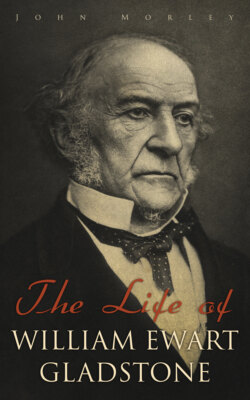Читать книгу The Life of William Ewart Gladstone - John Morley - Страница 74
На сайте Литреса книга снята с продажи.
V
ОглавлениеBefore leaving office Peel wrote to Mr. Gladstone (June 20) requesting him to ask his father whether it would be acceptable to him to be proposed to the Queen for a baronetcy. 'I should name him to the Queen,' he said, 'as the honoured representative of a great class of the community which has raised itself by its integrity and industry to high social eminence. I should gratify also my own feeling by a mark of personal respect for a name truly worthy of such illustration as hereditary honour can confer.' John Gladstone replied in becoming words, but honestly mentioned that he had published his strong opinion of the injurious consequences that he dreaded from 'the stupendous experiment about to be made' in commercial policy. Peel told him that this made no difference.180
LORD GEORGE BENTINCK
At the close of the session a trivial incident occurred that caused Mr. Gladstone a disproportionate amount of vexation for several months. Hume stated in the House that the colonial secretary had countersigned what was a lie, in a royal patent appointing a certain Indian judge. The 'lie' consisted in reciting that a judge then holding the post had resigned, whereas he had not resigned, and the correct phrase was that the Queen had permitted him to retire. Lord George Bentinck, whose rage was then at its fiercest, pricked up his ears, and a day or two later declared that Mr. Secretary Gladstone had 'deliberately affirmed, not through any oversight or inadvertence or thoughtlessness, but designedly and of his own malice prepense, that which in his heart he knew not to be true.' Things of this sort may either be passed over in disdain, or taken with logician's severity. Mr. Gladstone might well have contented himself with the defence that his signature had been purely formal, and that every secretary of state is called upon to put his name to recitals of minute technical fact which he must take on trust from his officials. As it was, he chose to take Bentinck's reckless aspersion at its highest, and the combat lasted for weeks and months. Bentinck got up the case with his usual industrious tenacity; he insisted that the Queen's name stood at that moment in the degrading position of being prefixed to a proclamation that all her subjects knew to recite and to be founded upon falsehood; he declared that the whole business was a job perpetrated by the outgoing ministers, to fill up a post that was not vacant; he imputed no corrupt motive to Mr. Gladstone; he admitted that Mr. Gladstone was free from the betrayal and treachery practised by his political friends; but he could not acquit him of having been in this particular affair the tool and the catspaw of two old foxes greedier and craftier than himself. To all this unmannerly stuff the recipient of it only replied by holding its author the more tight to the point of the original offence; the blood of his highland ancestors was up, and the poet's contest between eagle and serpent was not more dire. The affair was submitted to Lord Stanley. He reluctantly consented (Oct. 29) to decide the single question whether Bentinck was justified 'on the information before him in using the language quoted.' There was a dispute what information Bentinck had before him, and upon this point, where Bentinck's course might in his own polite vocabulary be marked as pure shuffling, Lord Stanley returned the papers (Feb. 8, 1847) and expressed his deep regret that he could bring about no more satisfactory result. Even so late as the spring of 1847 Mr. Gladstone was only dissuaded by the urgent advice of Lord Lincoln and others from pursuing the fray. It was, so far as I know, the only personal quarrel into which he ever allowed himself to be drawn.
